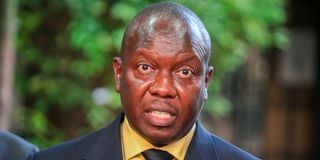History repeats itself with DPP ‘impunity’ on cases

Director of Public Prosecutions Renson Ingonga addresses the media in Nairobi on July 23, 2024.
What you need to know:
- A more overt and systematic withdrawal of such cases began after the 2022 General Election.
- The timing and nature of cases, and the personalities involved, have been of particular concern.
The legal battles between the Ethics and Anti-Corruption Commission (EACC) and the Director of Public Prosecutions (DPP) in court over the withdrawal of high-profile corruption cases has exposed high-octane legal-political power plays in the prosecution of crime in Kenya. This has brought into sharp focus the powers of the DPP vis-à-vis investigative agencies and the place of public interest.
A more overt and systematic withdrawal of such cases began after the 2022 General Election with the then-DPP—now National Intelligence Service Director-General—Noordin Haji. At the time, most (if not all) individuals whose cases were withdrawn were being considered for government appointments.
Enter DPP Renson Ingonga in September 2023. Within six months in office, he had presided over the “euthanasia” of multiple corruption-related cases worth almost Sh100 billion.
Abandoned or withdrawn were cases against former Treasury Cabinet Secretary Henry Rotich, Kenya Revenue Authority chairman Anthony Mwaura, former Nairobi Governor Mike Sonko, former Kenya Pipeline Corporation boss Charles Tanui and chief engineer Josephat Kipkoech Sirma, and former Geothermal Development Company managing director Silas Simiyu, among others.
This streak of impunity attracted hue and cry from the public, civil society, courts and EACC. The timing and nature of cases, and the personalities involved, have been of particular concern. In fact, they were among the grievances that fuelled the recent Gen Z protests, considering that most of the beneficiaries were appointed into government.
Admittedly, Article 157(6)(c) of the Constitution empowers the DPP to discontinue, at any stage before judgment, any criminal proceedings instituted or taken over by the DPP. But the supreme law also attempts to limit this power under Article 157(7) by requiring that such withdrawal of cases shall be with the permission of the court.
The Constitution guarantees the independence of the office of the DPP. However, the DPP does not exercise absolute and unfettered authority. Article 157(11) gave the caveat that the DPP, in exercising this power, has to take into consideration the public interest, interests of the administration of justice and the need to present and avoid abuse of the legal process.
Abuse of prosecutorial powers
The DPP is obligated to pursue the ends of justice by prosecuting criminal cases to the logical conclusion. It is not in his purview to determine the innocence or guilt of an accused person; that is the business of the courts.
In exceptional circumstances where the DPP decides to terminate a case or withdraw charges against any person, he must convince the court that such actions are in the public interest, serve the cause of justice and are not an abuse of the court process.
Kenya has a long history of abuse of prosecutorial powers that is well documented. The longest-serving Attorney-General of Kenya, Amos Wako, when prosecution was domiciled in the AG’s office, was known for the infamous nolle prosequi.
The power to enter nolle prosequi — a Latin phrase for “the authority to discontinue a criminal case in court at any stage before judgment, without having to give any reasons or to seek the permission of the court in order to do so”—was provided for under the former constitution.
In 1993, an attempt by the Law Society of Kenya (LSK) to privately prosecute the masterminds of the Goldenberg scandal was thwarted by Mr Wako. A similar effort by former Prime Minister Raila Odinga in 1995 to prosecute Prof George Saitoti, and others for fraudulent payment of up to Sh18 billion in export compensation for goods that were never exported, aborted.
In 2005, the LSK filed 12 charges against Mr Wako, accusing him of improperly advising the government to pay the non-existent Anglo Leasing and Finance Company. Mr Wako terminated the LSK’s prosecution attempt by having then-DPP Keriako Tobiko enter a nolle prosequi in the case, arguing that he had the power to do so.
Most progressive constitutions
The relationship between the AG and the now-defunct Kenya Anti-Corruption Commission then was characterised by frequent public recrimination and buck-passing over inadequate investigations and prosecutorial inaction. This resulted in an unproductive relationship marked by repeated public spats and the stalling of the fight against corruption.
What we are witnessing is a repeat of history, happening under one of the most progressive constitutions. While Mr Wako’s infamous nolle prosequi were few and far between, Mr Ingonga’s entry into the prosecution office has been characterised by iron-fist tactics, a mockery to Kenyans, and often with a tinge of mta-do!
The standard of proof in a criminal case is “beyond reasonable doubt”. In the now-familiar scenarios, where the DPP has clearly expressed doubt in his case, likely founded or motivated by other interests rather than public interests, what has the court to do?
The EACC, an investigative agency (give it to them), has on several occasions opposed the case withdrawals by the DPP on conviction that the cases presented to him are water-tight and capable of securing a conviction.
When former Samburu Governor Moses Lenolkulal was recently arraigned in the anti-graft court, the DPP—which, ironically, had earlier sought to withdraw the case—pleaded for a harsh sentence against him.
Remarkably, the court ordered Mr Lenolkulal to pay a Sh83.4 million fine and banned him from public office for 10 years. That made him the first former county chief to pay the price for the menace of endemic corruption since the advent of devolution in 2013.
So, what next? Should the court decline the withdrawal of corruption charges against a suspect, will the same DPP be expected to prosecute, present evidence and prove the case beyond reasonable doubt? Your guess is as good as mine.
Mr Mbiti is an advocate of the High Court and anti-corruption expert; [email protected]





